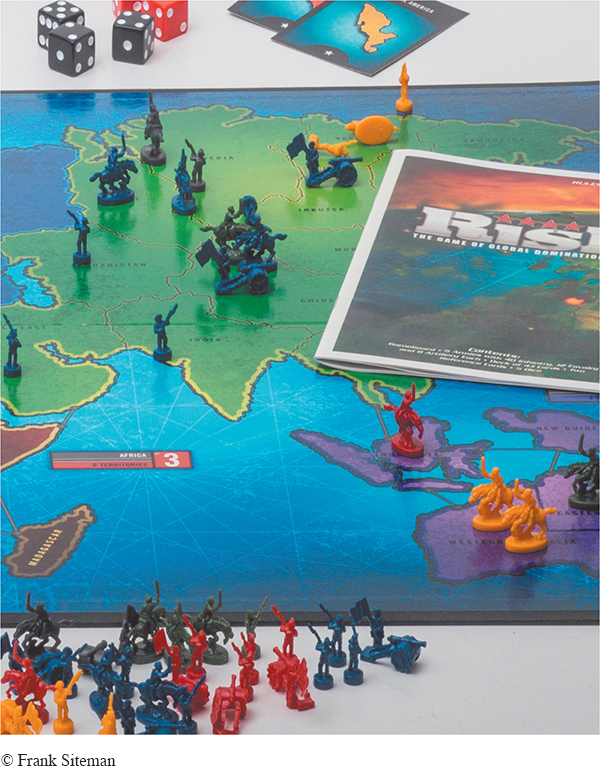8.1 Chapter Introduction
I t was winter break, and Steve’s sons—Kyle, Colin, and Conor—were home from college. This could mean only one thing: time to get old school, break out the Risk game board, and let the quest for world domination commence! With holiday decorations as a festive backdrop, Steve and his sons became immersed in their annual tradition of global conflict.
The board game Risk was invented by French film director Albert Lamorisse, who dubbed it “La Conquête du Monde”—the conquest of the world. Parker Brothers purchased the rights to U.S. distribution, and renamed it “Risk” (Risk, n.d.). The game involves multiple players moving armies around forty-two territories grouped into six continents. Players can challenge each other to battles with dice rolls—the win being granted to the player who has the higher roll—or strategically avoid such clashes, building their armies. The ultimate goal is occupation of all the territories in the world. Although Risk sounds like a straightforward board game, it’s not. Players start out with equal numbers of armies; hence, in order to eventually win, one must form (and betray) alliances with other players to build and sustain their armies, strategically avoid conflicts that appear too costly, and carefully consider outcomes prior to initiating battles—all the while keeping in mind that the outcomes of battles are at the mercy of random dice rolls.
As the night wore on in the McCornack kitchen, the four men calculated approaches for dealing with impending conflicts based on comparative power. Territorial disagreements escalated into fights that were won, were lost, or ended in compromise. Colin and Conor forged a collaborative agreement: by promising to not attack each other, they created the opportunity to restructure their positions. Steve initiated several small-scale attacks against Conor, whose annoyance quietly built. Eventually Conor’s anger exploded and he took his revenge, wiping out all of Steve’s armies and conquering his territories so that Steve was knocked from the game. In the end, it was Colin who won the world. By forging alliances and collaborating to help others achieve their goals, he took all of his accumulated armies and swept Kyle and Conor off the board. The victor and his vanquished shook hands, and the game board was reluctantly stowed away for another year.
Conflicts aren’t board games. Most of us don’t find fighting “fun,” and we certainly can’t stuff our battles back into a cabinet when we’re done with them. But Risk does mirror many aspects of the conflicts we experience in our daily lives. We choose to engage or avoid conflicts with others depending on how much power each of us has. When collaboration will optimize our outcomes, we pursue it. Sometimes we compromise, restructuring our original desires. Other times we attack, seeking to dominate. When we suffer repeated annoyances, we often stew to the point of explosion. And overarching all of this—shading every aspect of the conflicts we experience—is the real risk. Will we “win the game”? Or will everything we’ve worked so hard for be taken from us?
Page 191

© Frank Siteman
Page 192
Yet there’s also a key difference between Risk and our real-world skirmishes: the outcomes we experience in the wake of actual conflicts aren’t determined by a throw of the dice. Instead, there’s a systematic connection between the conflict choices we make and the personal, relational, or professional outcomes that result. When you deal with conflicts by exclusively blaming others, refusing to acknowledge your own accountability, and communicating in hostile and demanding ways, you inevitably create negative outcomes. But when you approach conflict as a communication challenge, best solved by being respectful, flexible, and mutually oriented, you create the possibility of successfully resolving dilemmas in ways that satisfy you and others. In this chapter, you’ll learn:
What conflict is and how it unfolds as a process
Which approaches to managing conflict are least—and most—competent
How the conflict-management approach you use affects the outcomes that result
What barriers exist to managing conflict well, and how they can be overcome

 LearningCurve can help you review! Go to macmillanhighered.com/
LearningCurve can help you review! Go to macmillanhighered.com/